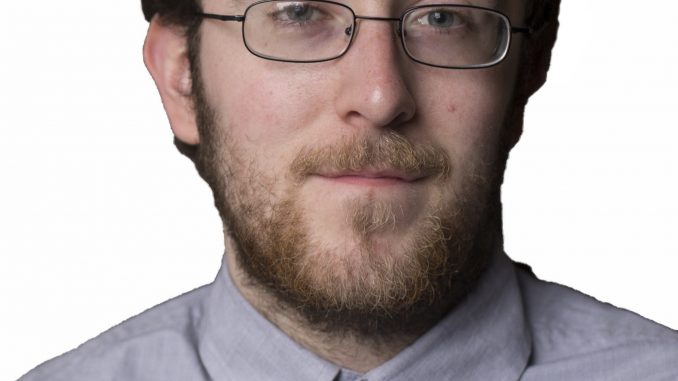
 Some might say it was a sign from above that an investigative reporting class I hoped to take this semester was canceled due to low enrollment, forcing me to replace it with a class on the business of journalism—where we pick apart the decline in newspaper readership and examine what’s next for news.
Some might say it was a sign from above that an investigative reporting class I hoped to take this semester was canceled due to low enrollment, forcing me to replace it with a class on the business of journalism—where we pick apart the decline in newspaper readership and examine what’s next for news.
“If you are interested in registering for another course, please register at your earliest opportunity,” read an email from the journalism department, which arrived on a Wednesday in mid-November. “We do apologize for the inconvenience. Thanks for your understanding.”
Investigative reporting has been taught by Professor Linn Washington, a former reporter for the Philadelphia Daily News and Philadelphia Tribune. And while the class has ran with as few as four students in the past, the only other person I know who signed up for the class this time was my roommate, who serves as the News Editor of this fine publication.
If some cosmic force (or Edward R. Murrow’s ghost) is trying to send me a message through my class schedule, it’s that investigative reporting and finance are linked. And it’s well-documented that even as the behemoths of American media continue dogged investigation, plenty of local outlets have had trouble keeping up with it.
Some of the most inspiring and meaningful pieces of journalism come after months of stressful negotiating with sources who may want to be anonymous. Preparing an earthshattering investigative report is best left to journalists who have tact and experience—but that needs to come from somewhere.
I only watched from the periphery and checked the spelling and grammar in a round of editing “Pain and the Game,” an award-winning piece in The Temple News which followed a seven-month investigation into abuse and neglect in the track & field program. But I could see the dedication to excellence brought by the piece’s authors, who each served a year as editor-in-chief here. In the weeks following publication, an administrator whose leadership was challenged in the piece was removed from overseeing the track & field program, and the team now has a new coach.
The cancelation of Investigative Reporting is coincidentally tied to the Academy Award-nominated film “Spotlight,” which portrays the Boston Globe’s 2002 investigation into sexual abuse in the Catholic Church. A few hours after I learned the class was canceled, the staff of our paper met with Walter Robinson, the Pulitzer-winning editor portrayed by Michael Keaton in the film.
And there’s a local tie too. Philadelphia Media Network—the parent company of the Inquirer, philly.com and the Daily News, where I was an intern for six months—made headlines this month for a new arrangement that will bring the company under a nonprofit dedicated to new media. As the arrangement is still new, it’s hard to gauge its benefit, though I’m optimistic about its potential benefits for the city: PMN could likely use some nonprofit magic to boost investigation after 46 journalists were laid off on Nov. 4.
Through all the struggles with ownership, however, journalists at the company have continued to pursue tough stories like the Porngate scandal, the indictment of U.S. Rep. Chaka Fattah and the government moneypit that is City Commissioner Anthony Clark.
All of these are examples of local reporting that can effect change—and have inspired me.
Journalists are supposed to be watchdogs for government and institutional corruption. We should be the Fourth Estate, and this role presents itself most clearly when investigative reports shake institutions to the core.
“We’re a watchdog not just on government but on corporations, on powerful people who really shape the direction of our society,” Washington said.
But with all this humdrum about the importance of that work, the art of the investigation has “really been devalued,” Washington told me when I met with him to talk about the class. “We focus on shorter and shorter stories and more superficial content.” And cuts to staff have exacerbated the problem: in an ideal world, the investigative reporters would be some of the most experienced on the staff, but sometimes years of guaranteed raises and benefits can make the most senior reporters the most expensive and an unfortunate target for owners cutting costs.
Nonprofits and journalism ally institutions are fighting to preserve the investigative reporting that has made this country great, and public officials more fearful of those who seek truth. But we as students ought to do our part to support it too.
A start for Temple’s journalism majors would be to join Washington’s class en masse next semester. Another possibility is to join Investigative Reporters and Editors, as so many of my professors have advised.
Whether it be enrolling in classes or practicing the art of investigation through an internship, we, as student journalists looking to be the next watchdogs, need to ensure this craft isn’t lost to history.
Joe Brandt can be reached at jbrandt@temple.edu or on Twitter @JBrandt_TU.


Be the first to comment